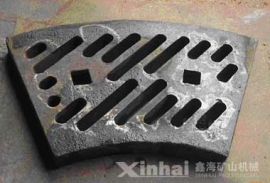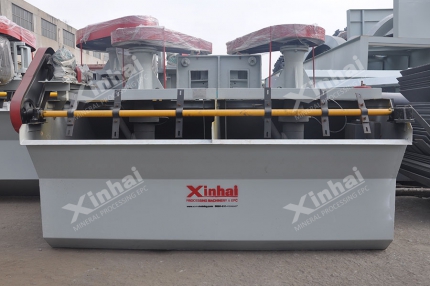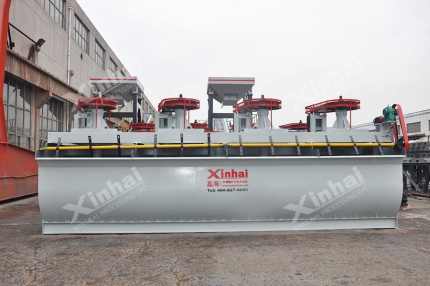There are many kinds of zinc oxide minerals, and the common zinc oxide minerals with industrial value are rzine and heterogeneous minerals. The mineral composition and structure of zinc oxide are more complex, and easy to mudze, when the selection is not large, froth flotation method is commonly used as the main selection method.
At present, the commonly used flotation methods of zinc oxide ore include sulfide-amine salt flotation method, sulfur-yellow drug flotation method, fatty acid direct flotation method, flocculation flotation method and chelation flotation method.

Use the table of contents below to navigate through the guide:
01Zinc oxide sulfide-amine froth flotation method
Sulfide-amine froth flotation method is to first sulfide the zinc oxide through the sulfide agent, and then use the fatty amine collector to select. However, the sulfide-amine salt flotation process is more sensitive to the mineral sludge and soluble salt, and the pharmaceutical consumption is relatively large. At present, the combination agents commonly used in this process, such as amine collector and yellow medicine, can capture zinc oxide mineral-dipolar mine and iron diamond zinc mine.
This method is suitable for flotation of rzite, zinc and silica, and it is not suitable to treat ores containing mica, sericite, chlorite or carbonaceous shale.

02Zinc oxide sulfolation-yellow drug froth flotation method
In the sulfide-yellow oxide flotation method, the same need to sulfize the zinc oxide in advance, and need the further activation of copper sulfate, and then use advanced zinc oxide for capture. In addition, this method needs to be heated in the flotation process, and the sulfation of zinc oxide minerals can only be activated by copper sulfate.
However, the vulcanization-yellow drug flotation method has poor effect on zinc, low recovery rate, and excessive sulfation agent has obvious inhibitory effect on the flotation of zinc oxide.
03Inc oxide reverse froth flotation method
Reverse flotation method is to use sulfuric acid to adjust the pH of the zinc coarse concentrate pulp, so that when the PH is 7, starch is used to inhibit zinc oxide minerals, and remove the gangue minerals by reverse flotation. This method can effectively remove most of the carbonate, sulfate and iron gangue minerals (such as mica, sericite, chlorite, etc.).

04Zinc oxide fatty acids of direct froth flotation method
Fatty acid flotation is a direct selection of zinc oxide ore. This process has a good flotation effect for zinc oxide ore containing silica gangue or muddy gangue minerals.
However, direct flotation of zinc oxide ore has poor flotation effect for zinc oxide ore containing carbonate gangue minerals and not ideal for zinc oxide ore containing high iron. Because of its poor selectivity applied to most ores, the method has not been applied in industry.

05Zinc oxide flocculation froth flotation method
Flocculation flotation is a flotation method for fine-grained zinc oxide minerals. Before flotation, and then sulfhydryl carboxylic acid was used as a collector for zinc oxide. The advantage of this process are that no mud removal during flotation and the amount of sodium sulfide is reduced. Disseminant and flocculant need to be added in the flotation process, which includes sodium carbonate, sodium pyrophosphate, potassium pyrophosphate, ammonium pyrophosphate, etc. The flocculant is mostly alkaline starch or alkaline tapioca powder.
This method can overcome some disadvantages of the conventional flotation method, so that the recovery rate of zinc can be greatly improved (more than 5%), and the drug cost can also be reduced.

06Zinc oxide chelation froth flotation method
Chelating flotation is a method of separating zite and gangue mineral by using the collector (octyl fatty acid). The flotation method has good selectivity and capture performance. However, when the mineral combination agent is expensive and used as a collector alone, the mineral surface hydrophobicity is not strong enough and the dosage is very large, so it is difficult to be widely used in the production practice.

These are the common zinc oxide ore flotation methods. In addition, for some zinc oxide mines with complex structure and special properties, when the above flotation method cannot obtain the ideal selection index, the combined separation methods such as flotation, magnetic flotation and flotation will be adopted. As for the selection of the flotation method, it is necessary to choose the appropriate flotation process according to the oxidation degree of zinc oxide mineral and the composition of the gangue ore. Therefore, it is suggested that the mine owner should carry out the beneficiation test, and customize the scientific and reasonable flotation process through the test report to improve the flotation index and reduce the economic loss.


 marketing@ytxinhai.com
marketing@ytxinhai.com  0086 13810327080
0086 13810327080 






































































































 CHAT
CHAT MESSAGE
MESSAGE








